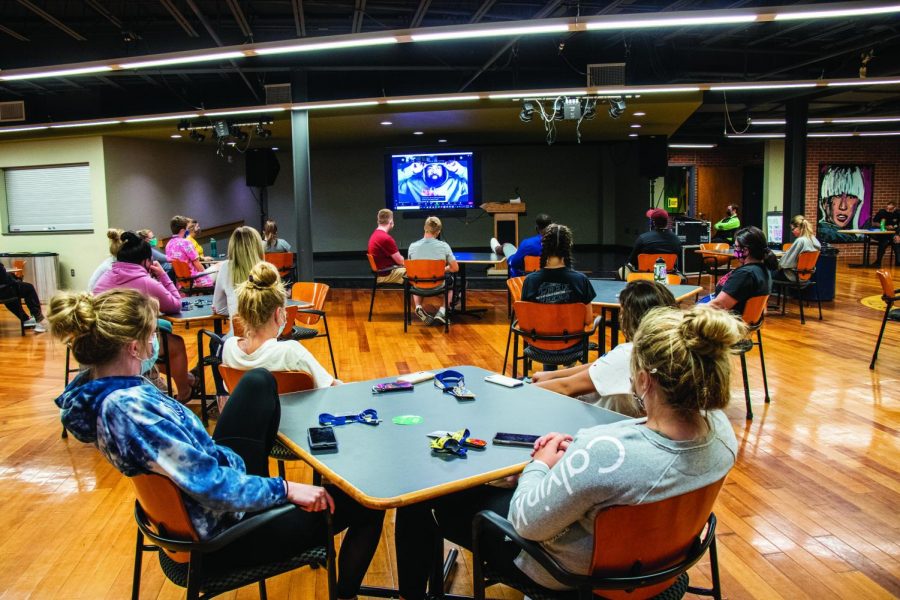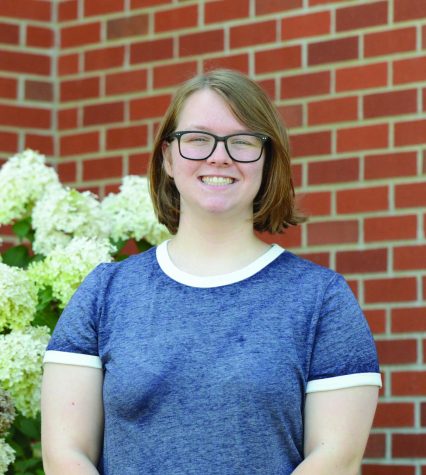BSA breaking down stereotypes with key speaker
Dr. Jason Sole, a criminal justice educator and author, speaking to students about breaking down stereotypes at a Black Student Alliance presentation in Jack’s Place Sept. 3.
September 9, 2020
The Black Student Alliance’s (BSA) recent event, “From Prison to Ph.D.” brought in a wide audience Thursday, Sept. 3, both in person in Jacks’ Place and over Zoom.
Presented by Dr. Jason Sole, an activist, criminal justice educator and former felon, he discussed his experiences growing up in Chicago surrounded by poverty and gang activity, and how he eventually joined a gang in his early teens.
“Those situations change you, and they were changing me and I didn’t know it,” he said during the event.
After more hardships through his high school years, including being denied entrance into the Air Force due to a childhood illness, Sole moved to Minnesota and became involved in more gang-related activity and selling drugs, for which he was eventually arrested and spent two years in jail.
He described his struggles afterwards to find housing and a job, as well as his treatment from Minneapolis police, who continued to harass and profile him based on his status as a former felon.
“That’s the new Jim Crow,” he said, referring to these issues. He described different instances of being harassed, including at one point being pulled over and having property damaged by police officers.
He began attending Metro State University in St. Paul, Minnesota at 25, where he studied criminal justice and eventually received his bachelor’s degree. He started working for universities like MSU and Hamline University in St. Paul teaching criminal justice studies. Meanwhile, he explained that some of his students were the same police officers who stereotyped him.
Along with teaching, Sole became more involved in activism starting at MSU, and eventually became the president of the Minneapolis branch of the National Association for the Advancement of Colored People (NAACP).
He also began the movement “Humanize My Hoodie” with his long-time friend Andre Wright. It started when he wore hoodies to class for an entire semester to raise awareness of negative stereotypes projected onto black men wearing such clothing. The pair now use the idea to train non-black allies in avoiding stereotypes and working towards racial justice.
The BSA reached out to Sole and asked him to speak about his experiences largely due to the recent protests and activity of the Black Lives Matter (BLM) movement.
“He’s really good at answering questions,” said Adonai Ghebrekidan, the vice president of BSA. “He likes when people like to ask the questions that are kind of hard.”
Sole spent the latter half of the event discussing those recent events and his own experiences with police violence and protests, like witnessing protests for Mike Brown in Ferguson, Missouri in 2014 and for Philando Castile in Minnesota in 2016. Currently, he is researching more about abolishing the police and alternatives to prison sentences.
“I want to change the conditions, I want to change the way we think about other people,” he said.
Ghebrekidan disclosed that people like Sole sharing their experiences can help break down the beliefs many people have about those who have gone through the justice system, specifically that they are not expected to succeed.
“You can’t base things off of stereotypes, you have to base them on situations,” he said.
BSA Advisor Alex Wood also believes that Sole’s insights into how to address those issues can push students to begin thinking about how to rectify those problems themselves.
“It’s not just about saying, ‘Hey, something’s wrong, I’m going to be mad about it or upset about it,’” he said, “It’s what are you going to do next and how are you going to take on the challenge of saying, ‘what can we do to change things?’”
The event gave students the chance to ask Sole questions about his experiences and what they could do to be better allies to the BLM movement, which Wood believes can help students on predominantly non-black campuses like South Dakota State University grow more comfortable with asking questions and having conversations about similar topics.
“To have the discussions, to have that focal point of what’s going on is to give everyone a better understanding,” Sole said.
Hattie Seten, president of the Students’ Association and an attendee of the event, explained what she took away from the event, as well.
“I thought it was really interesting to hear about his resilience in being in prison and making it all the way to becoming a professor, and being able to work in criminal justice and teach students about criminal justice from his own personal experience,” she said.
The BSA has plans for future events that further address these issues, and hopes that they can help students at SDSU begin understanding the situations they discuss.
“Being able to have conversations on college campuses I think are increasingly more fruitful in the sense that this is the ground in which ideas are freely and openly out there,” Wood said. “It can also give you an opportunity to really address and look at just what’s happening out in life in general.”

























